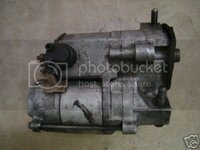denpo
Carburated Nihilist
I'm already slapping myself enough for not checking starter clearance when the engine and bellhousing was out, now, from reading other conversion I read people mentioning the mandatory starter change. Seems to have to do with starter gear type metal.
Do you guys confirm/infirm?
Do you guys confirm/infirm?

